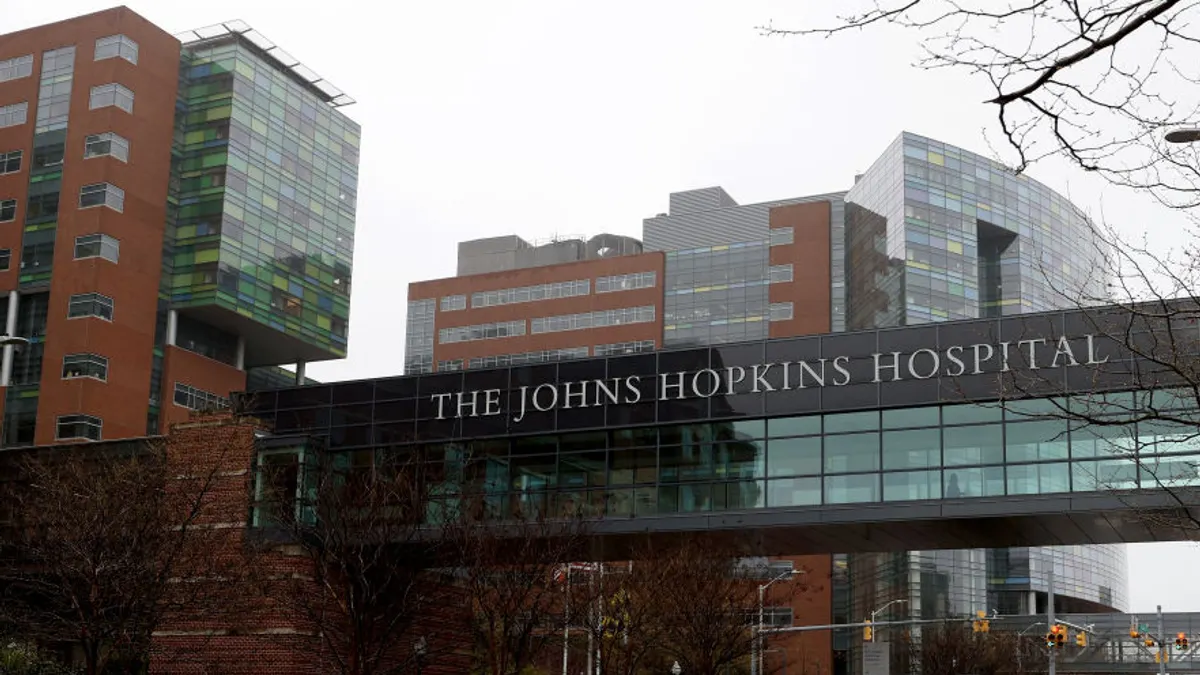UPDATE: Sept. 18, 2025: Johns Hopkins and UnitedHealthcare have officially called off contract discussions, keeping the academic medical system out of network with the insurance giant. “Despite our best efforts to find common ground over the past eight months of negotiations, Johns Hopkins Medicine and UnitedHealthcare have concluded contract negotiations without reaching an agreement,” the Baltimore-based system said in a statement on its website Tuesday.
Dive Brief:
- Johns Hopkins is now out of network for UnitedHealthcare members after the Baltimore-based health system and the insurer failed to reach a new contract agreement despite months of negotiations.
- The previous contract expired on Monday. As a result, roughly 60,000 UnitedHealthcare enrollees can no longer receive covered services at Johns Hopkins facilities in Maryland, Virginia and Washington, D.C.
- UnitedHealthcare and Johns Hopkins blamed each other for the contract lapse. Negotiations are ongoing and could result in a new agreement in the coming months.
Dive Insight:
UnitedHealthcare and Johns Hopkins have been at the negotiating table for eight months trying to hammer out a contract to keep the nonprofit system’s six hospitals and more than 40 other care locations in network.
However, despite multiple extensions, UnitedHealthcare and Johns Hopkins failed to reach an agreement before Monday’s deadline — and Johns Hopkins refused another extension, electing to go out of network instead, according to UnitedHealthcare.
In a rarity for insurance contract renegotiations, the impasse didn’t stem from money. Johns Hopkins and UnitedHealthcare agreed on rate increases. But the two couldn’t agree on other terms.
In particular, Johns Hopkins wanted the right to refuse treatment for specific employers, which would give it the ability to turn away UnitedHealthcare members who should be treated in network, according to the payer.
Johns Hopkins also wanted UnitedHealthcare to agree to pay claims it submits to the insurer for patients who were once enrolled in UnitedHealthcare plans, but aren’t any longer.
“Johns Hopkins refused to move off contractual terms no other health system in our network requires, including language that would allow it to deny patient access at its discretion. Despite our repeated efforts to compromise and extend our contract to avoid disruption, Johns Hopkins refused,” Joseph Ochipinti, CEO of UnitedHealthcare’s mid-Atlantic region, said over email.
Meanwhile, Johns Hopkins says it was seeking terms to protect patients from practices that create barriers to care and make life more difficult for clinicians. That includes paring back excessive prior authorization requirements, treatment denials, administrative burdens and payment delays.
Johns Hopkins typically has millions of dollars in unpaid claims submitted to UnitedHealthcare, the system said in a notice.
“This is not about money, nor is it about small administrative issues. We are negotiating our contract with United so that we can avoid aggressive claim denials that delay necessary care, excessive red tape that forces patients to wait for treatments, and significant payment delays that strain our ability to provide care. We will not sign a contract that allows an insurance company to put profits over patients’ health and well-being,” Kim Hoppe, Johns Hopkins’ vice president of public relations, said in a statement.
Both UnitedHealthcare and Johns Hopkins pledged to continue negotiations. But for now, people in UnitedHealthcare’s employer-sponsored plans, individual family plans, Medicare Advantage and Medicaid plans have found themselves out of network at Johns Hopkins hospitals and facilities except in the state of Florida.
Johns Hopkins’ doctors are also now out of network for people in employer-sponsored coverage. The physicians already did not participate in UnitedHealthcare’s MA and Medicaid networks.
Members of the Veteran Affairs Community Care Network are not impacted and will continue to have access to Johns Hopkins.
Patients scheduled to receive a transplant at a Johns Hopkins facility will continue to have that care covered in network, according to UnitedHealthcare. In addition, patients receiving ongoing treatment at Johns Hopkins for serious or complex conditions can apply to UnitedHealthcare to continue receiving in-network care with their physician.
Providers and insurers are constantly renegotiating contracts. The vast majority of discussions end in renewed agreements without disruption to patients.
But more showdowns have been trickling into the public eye as insurers try to control snowballing medical costs and providers seek rate increases, citing rising expenses from providing care. Providers also use the renegotiations as an opportunity to pare back red tape put in place by insurers to control medical utilization that they believe delays or prevents necessary care.
Taking contentious contract negotiations public is a negotiating tactic for systems, which bank that patients — concerned about losing access to their local medical facilities — will pressure their insurance carrier to accept terms.
This year has seen a flurry of high-profile contract spats, including between Jefferson Health and Cigna, Broward Health and Florida Blue and Southwestern Health Resources and a Texas Blues plan. Anthem Blue Cross Blue Shield has had two health systems — MU Health Care in Missouri and Northern Light Health in Maine — sever ties, citing insurmountable differences over prices and other issues. (Anthem and MU later reached an agreement for retroactive in-network coverage.)
The saga with Johns Hopkins is also not UnitedHealthcare’s first contract dispute to spill into the open in 2025.
In July, roughly 20,000 UnitedHealthcare patients in Rhode Island lost access to Brown Health hospitals after the two companies failed to renew their contract despite months of negotiations.
UnitedHealthcare members in Alabama almost went out of network with one of the state’s largest health systems this summer. However, the payer reached an agreement with the University of Alabama at Birmingham Health System earlier this month.














